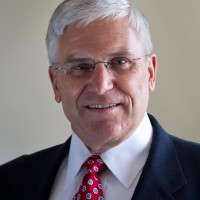36TH CHIEF OF STAFF OF THE UNITED STATES ARMY (Retired)
Accountability • Current Events • International Affairs • Leadership • Peak Performance • Teamwork / Team Building • Vietnam War
Washington, DC
 36TH CHIEF OF STAFF OF THE UNITED STATES ARMY (Retired)
36TH CHIEF OF STAFF OF THE UNITED STATES ARMY (Retired)
George William Casey, Jr. is a former United States Army four-star general who last served as the 36th Chief of Staff of the United States Army from April 10, 2007 to April 11, 2011. Casey previously served as Commanding General, Multi-National Force – Iraq from June 2004 to February 8, 2007 and had been in the Army for his entire adult working life.
Casey was commissioned through the Army ROTC in 1970 following graduation from Georgetown University.
Casey served in the Mechanized Infantry during the command portion of his career. He was commander of the 3rd Brigade of the 1st Cavalry Division, and the Assistant Division Commander – Maneuver (later Assistant Division Commander – Support) of the 1st Armored Division in Germany. He deployed as part of Operation Joint Endeavor to Bosnia-Herzegovina from July 1996 to August 1997. He and the Rear Command Post staff were based in Slavonski Brod, Croatia. Casey took command of the 1st Armored Division in July 1999.
After relinquishing command of the division in July 2001, Casey served in a senior staff position in the Pentagon as the Director of Strategic Plans and Policy, the Joint Staff from October 2001 to January 2003. His next position was Director of the Joint Staff in Washington, D.C. from January 2003 to October 2003. Following these assignments, Casey was nominated and confirmed as the 30th Vice Chief of Staff of the Army, serving in that post until June 2004.
Casey served as the senior coalition commander in Iraq from June 2004 to February 2007. He replaced Lieutenant General Ricardo S. Sanchez. Casey’s goal was to encourage the Iraqis to take ownership of their problems and responsibility for their own security. For his part as a military commander, he focused on training Iraqi forces, limiting the role of American forces, and transferring the burden for providing security to Iraqi forces. Meanwhile, U.S. diplomats would focus on building and strengthening the Iraqi government and help the Iraqis hold elections. He expressed his view that a large and intrusive American presence in Iraq would not solve the political and security problems in that country and could even fuel the insurgency.
In January 2007, President George W. Bush nominated Casey for elevation to Chief of Staff of the Army. The Senate confirmed his nomination on February 8, 2007 with a bipartisan vote of 83-14.
On February 10, 2007, Casey relinquished command in Iraq to General David Petraeus. Casey officially succeeded General Peter Schoomaker as Chief of Staff of the Army on April 10, 2007.
As the 36th Chief of Staff of the US Army from April 2007 to 2011, General Casey led what is arguably the world’s largest and most complex organization — 1.1 million people strong, with a $200+ billion annual budget — during one of the most extraordinary periods in military and global political history. He became Chief of Staff of an Army that was stretched from 6 years of continuous war. Over his tenure he stabilized and transformed the Army to meet the challenges of the 21st Century while continuing to meet the demands of two wars. General Casey transformed an Army trained and prepared for conventional war, to an agile force more suited to today’s challenges.
He accelerated the growth of the Army, instituted Retention Bonuses for young officers, increased the funding for Soldier and Family Programs, improved the way the Army cared for its Wounded Soldiers and Surviving Family Members and drove down the stigma associated with behavioral health counseling to stabilize an Army stretched by war. He also improved the leadership training for the Army’s General Officer Corps, advanced the transformation of the Army’s business and decision making processes, moved the Army onto a rotational deployment program much like the Marine Corps’ and oversaw a substantial improvement in the capabilities of the Army National Guard and Army Reserves.
On April 11, 2011, Casey handed over his position as Army Chief of Staff to Martin E. Dempsey and retired from the Army at a ceremony in Fort Myer, VA.